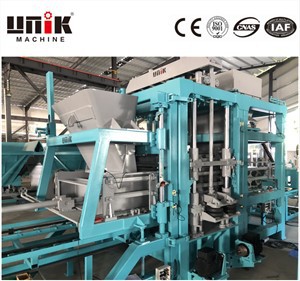Why Is a Block Machine Essential for Modern Construction?
2025-01-02
In the world of construction, efficiency, durability, and cost-effectiveness are key to success. As construction projects become larger and more complex, having the right equipment is critical for meeting these demands. One such essential tool is the block machine. But why exactly is a block machine considered indispensable in modern construction, and how does it contribute to enhancing productivity, reducing costs, and improving the quality of the structures we build?
In this blog, we’ll explore the importance of block machines in construction, their types, and the benefits they bring to construction projects of all sizes.
What Is a Block Machine?
A block machine is a mechanical device used to produce concrete blocks, bricks, and other masonry materials that are widely used in construction. These machines mix raw materials like cement, sand, and water to create blocks of different sizes, shapes, and strengths, which are then used for walls, pavements, foundations, and other structural elements.
Block machines come in various types, such as manual, semi-automatic, and fully automatic models, each designed to meet specific production needs and project scales. The ability to produce high-quality, uniform blocks quickly and efficiently has made block machines a crucial component of modern construction.
Why Are Block Machines Important in Modern Construction?
1. Improved Efficiency and Productivity
One of the most significant advantages of using a block machine is its ability to streamline the production of building materials. Traditional methods of making concrete blocks or bricks are labor-intensive, time-consuming, and often inconsistent in quality. A block machine, on the other hand, automates the process, allowing for faster production of high-quality blocks with minimal human intervention.
For construction companies, this translates to increased productivity and reduced labor costs. Instead of relying on manual labor to mix, mold, and cure each block, a block machine can produce hundreds or even thousands of blocks per day, depending on the machine’s capacity. This not only accelerates construction timelines but also allows companies to meet growing demand for materials in a more efficient manner.
2. Consistency and Quality Control
When it comes to building materials, consistency and quality are paramount. Uneven or poorly made blocks can lead to structural issues, safety concerns, and costly repairs. Block machines are designed to create uniform blocks with precise measurements, ensuring that each block meets the necessary strength and durability requirements.
Automated block machines are equipped with features that guarantee a consistent mix of materials, as well as precise shaping and molding. This ensures that every block produced is of high quality, reducing the likelihood of defects and improving the overall stability of the structure. For construction projects that require large quantities of materials, maintaining this level of quality control is essential.
3. Cost-Effective Solution
While the initial investment in a block machine may seem significant, it can lead to long-term savings for construction companies. By producing blocks on-site, companies can avoid the high costs of purchasing pre-made materials from suppliers. Additionally, the reduction in labor costs, faster production rates, and minimized waste contribute to lowering the overall cost of construction.
Block machines also provide flexibility in terms of production scale. Small-scale construction companies or entrepreneurs can opt for smaller, more affordable manual or semi-automatic machines, while larger companies can invest in fully automated block machines to meet the demands of large-scale projects. This scalability ensures that businesses of all sizes can take advantage of the benefits that block machines offer.
4. Sustainability and Waste Reduction
Sustainability is an increasingly important factor in construction, and block machines play a key role in making the industry more environmentally friendly. These machines are capable of utilizing recycled materials, such as crushed concrete, fly ash, or other industrial by-products, to produce eco-friendly blocks. This not only reduces the environmental impact of construction but also lowers material costs.
Moreover, because block machines are highly efficient, they minimize material wastage by using precise amounts of raw materials. The ability to produce the exact number of blocks needed reduces excess waste, contributing to a more sustainable construction process.
5. Versatility and Customization
Block machines are not limited to producing standard concrete blocks. Modern machines can produce a variety of masonry products, including:
- Pavers for roads and sidewalks
- Interlocking bricks for durable, low-maintenance pavements
- Hollow blocks for lightweight construction
- Curbstones for landscaping and road construction
Additionally, block machines can be customized to produce blocks in different shapes, sizes, and colors, offering builders a high degree of flexibility and creativity in their designs. Whether you need standard blocks for a building foundation or decorative blocks for an outdoor feature, block machines can adapt to the specific needs of any project.
Types of Block Machines
Depending on the scale of the construction project and the level of automation desired, block machines come in several types:
1. Manual Block Machines
Manual block machines require a significant amount of human labor to operate. These machines are typically smaller and more affordable, making them a popular choice for small construction companies or businesses just starting in the industry. While they require more hands-on effort, they are still capable of producing quality blocks with proper maintenance.
2. Semi-Automatic Block Machines
Semi-automatic machines are a step up from manual machines, offering some level of automation while still requiring some manual labor for tasks such as loading and unloading the molds. These machines are ideal for medium-sized businesses that need to balance automation with cost-effectiveness.
3. Fully Automatic Block Machines
Fully automatic block machines are the most advanced type, capable of producing blocks with minimal human intervention. These machines handle every step of the production process, from mixing the raw materials to molding and curing the blocks. With advanced control systems and high production rates, fully automatic block machines are best suited for large-scale construction projects or factories with high production demands.
Applications of Block Machines
Block machines are used in a variety of construction projects, including:
- Residential construction: Block machines produce concrete blocks used for walls, foundations, and other structural elements in homes and buildings.
- Commercial and industrial construction: High-strength blocks are used in commercial buildings, warehouses, and factories for both load-bearing and non-load-bearing structures.
- Paving and landscaping: Pavers and interlocking bricks are produced for roads, sidewalks, and decorative outdoor features.
- Infrastructure projects: Hollow blocks and curbstones are used in the construction of bridges, tunnels, and roadways.
Conclusion
Block machines are a cornerstone of modern construction, providing significant advantages in terms of efficiency, cost-effectiveness, and quality. Whether you're building a residential home or working on large-scale infrastructure projects, a block machine can help streamline the production of concrete blocks and other masonry materials, saving time and money while improving the overall quality of the construction process.
From small businesses to large construction companies, adopting a block machine is a smart investment for any industry professional looking to stay competitive in today’s fast-paced construction world. Have you considered using a block machine for your next project? Share your thoughts in the comments below!



